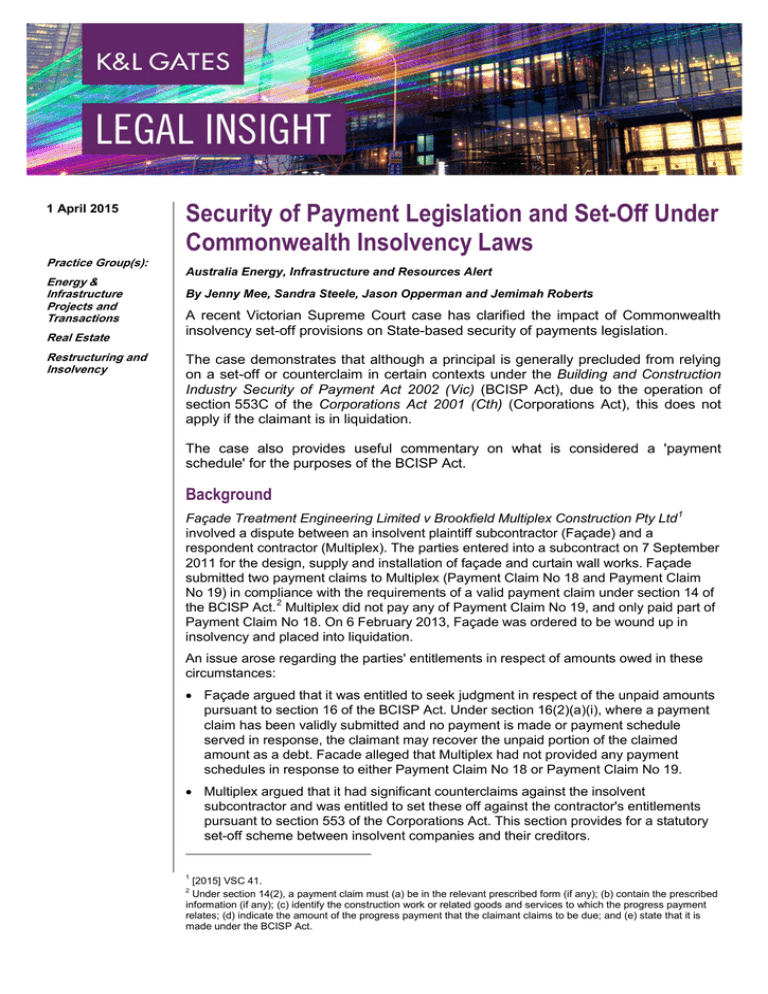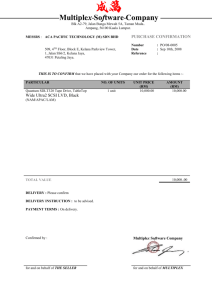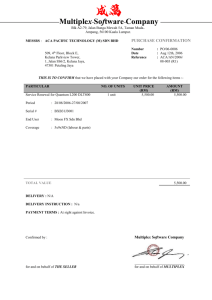
1 April 2015
Practice Group(s):
Energy &
Infrastructure
Projects and
Transactions
Real Estate
Restructuring and
Insolvency
Security of Payment Legislation and Set-Off Under
Commonwealth Insolvency Laws
Australia Energy, Infrastructure and Resources Alert
By Jenny Mee, Sandra Steele, Jason Opperman and Jemimah Roberts
A recent Victorian Supreme Court case has clarified the impact of Commonwealth
insolvency set-off provisions on State-based security of payments legislation.
The case demonstrates that although a principal is generally precluded from relying
on a set-off or counterclaim in certain contexts under the Building and Construction
Industry Security of Payment Act 2002 (Vic) (BCISP Act), due to the operation of
section 553C of the Corporations Act 2001 (Cth) (Corporations Act), this does not
apply if the claimant is in liquidation.
The case also provides useful commentary on what is considered a 'payment
schedule' for the purposes of the BCISP Act.
Background
Façade Treatment Engineering Limited v Brookfield Multiplex Construction Pty Ltd 1
involved a dispute between an insolvent plaintiff subcontractor (Façade) and a
respondent contractor (Multiplex). The parties entered into a subcontract on 7 September
2011 for the design, supply and installation of façade and curtain wall works. Façade
submitted two payment claims to Multiplex (Payment Claim No 18 and Payment Claim
No 19) in compliance with the requirements of a valid payment claim under section 14 of
the BCISP Act. 2 Multiplex did not pay any of Payment Claim No 19, and only paid part of
Payment Claim No 18. On 6 February 2013, Façade was ordered to be wound up in
insolvency and placed into liquidation.
An issue arose regarding the parties' entitlements in respect of amounts owed in these
circumstances:
• Façade argued that it was entitled to seek judgment in respect of the unpaid amounts
pursuant to section 16 of the BCISP Act. Under section 16(2)(a)(i), where a payment
claim has been validly submitted and no payment is made or payment schedule
served in response, the claimant may recover the unpaid portion of the claimed
amount as a debt. Facade alleged that Multiplex had not provided any payment
schedules in response to either Payment Claim No 18 or Payment Claim No 19.
• Multiplex argued that it had significant counterclaims against the insolvent
subcontractor and was entitled to set these off against the contractor's entitlements
pursuant to section 553 of the Corporations Act. This section provides for a statutory
set-off scheme between insolvent companies and their creditors.
1
[2015] VSC 41.
Under section 14(2), a payment claim must (a) be in the relevant prescribed form (if any); (b) contain the prescribed
information (if any); (c) identify the construction work or related goods and services to which the progress payment
relates; (d) indicate the amount of the progress payment that the claimant claims to be due; and (e) state that it is
made under the BCISP Act.
2
Security of Payment Legislation and Set-Off Under Commonwealth
Insolvency Laws
This raised a number of issues for the court to consider.
Conflict Between Corporations Act and BCISP Act?
A key issue in this case was the interaction between the Victorian BCISP Act and the
Commonwealth Corporations Act.
• Section 16(4)(b) of the BCISP Act expressly prohibits a defendant in
section 16(2)(a)(i) proceedings from bringing any cross-claim or raising any defence in
relation to matters under the parties' subcontract in the proceedings.
• By contrast, section 553C of the Corporations Act provides for a statutory set-off of
opposing claims where there are "mutual credits, mutual debts or other mutual
dealings" between an insolvent company being wound up and a creditor.
Justice Vickery considered that there was a conflict between these two sections, as
allowing a company in liquidation to recover entitlements under the BCISP Act
regardless of the existence of set-off or counterclaim would "fly directly in the face of
the scheme established by section 553C of the Corporations Act". 3
In such circumstances, it was held that section 109 of the Commonwealth
Constitution operated to resolve the tension between the Commonwealth and State
Acts. Under this section, where a law of a State is inconsistent with a law of the
Commonwealth, the latter (in this case, the Corporations Act) shall prevail to the
extent of the inconsistency.
This meant that Multiplex was able to rely on the statutory set-off scheme contained
in section 553C of the Corporations Act, despite the fact that this was not permitted
under the Victorian security of payments scheme. As such, Façade (ie an insolvent
company to which section 553C of the Corporations Act applied) was precluded from:
• entering judgment pursuant to section 16(2)(a)(i) of the BCISP Act
• relying on section 16(4)(b) as a bar to Multiplex bringing a cross-claim or raising a
defence by way of set-off. 4
Notice of Insolvency: Section 553C(2) of the BCISP Act
Notwithstanding the above, Façade argued that even if this was the case, Multiplex
was precluded from claiming the benefit of set-off under section 553C because of its
knowledge of Façade's insolvency.
Under section 553C(2) of the Corporations Act, a person may not claim the benefit of
a set-off if that person had 'notice' of the fact that the company was insolvent at the
3
See para [80].
4
See para [85]. Note, however, that the Court stated (at para [84]) that this position may be different where a
defendant evinces an intention not to proceed with its foreshadowed counterclaims (either expressly, or by letting
further and inordinate time pass without taking steps to prosecute these claims). In this event, Vickery J considered
that it would be open to a plaintiff to seek appropriate declaratory relief before proceeding to enter judgment under
section 16 of the BCISP Act.
2
Security of Payment Legislation and Set-Off Under Commonwealth
Insolvency Laws
time of "giving credit to the company, or at the time of receiving credit from the
company".
In considering this question, the court had to determine the appropriate time at which
notice of insolvency for the purposes of section 553C(2) should be assessed.
• The subcontractor submitted that the relevant date for the operation of
section 553C(2) was the time when the contractor (Multiplex) was liable under the
BCISP Act to pay the payment claims.
• By contrast, Multiplex submitted that notice should be assessed as at the date of entry
into the subcontract.
After reviewing the relevant authorities, Vickery J agreed with the latter approach,
holding that any notice of knowledge of Façade's insolvency on the part of Multiplex
should be considered as at the date the subcontract was executed. 5 As there was no
suggestion that Façade manifested any signs of insolvency at this date, or that any
such signs came to the attention of Multiplex, section 553C(2) did not operate to
preclude the set-off proposed to be advanced by Multiplex.
Payment Schedules
The case also provides useful guidance on what constitutes a valid payment
schedule for the purposes of section 15 of the BCISP Act. It was common ground
that Multiplex did not serve a valid payment schedule in respect of Payment Claim
No 18. However, on 5 October 2012, Multiplex sent Façade an email responding to
Payment Claim No 19, advising that it considered Payment Claim No 19 to be invalid.
Multiplex argued that this document satisfied the requirements of a payment
schedule under section 15 of the BCISP Act.
Façade argued that the email could not constitute a payment schedule for the
purposes of section 15, as:
• on its face, it did not purport to operate as a payment schedule
• the email did not indicate the amount of the claim, if any, it proposed to make
(contrary to what it argued was prescribed by section15(2)(b) of the BCISP Act).
Section 15(2)(b) relevantly provides that "[a] payment schedule … must indicate
the amount of the payment (if any) that the respondent proposes to make (the
scheduled amount)".
However, Vickery J rejected this approach stating that it was clear from the email that
Multiplex did not propose to pay anything in respect of Payment Claim No 19. His
Honour considered that a proposal to pay 'nothing' or 'nil' or 'zero' in a response to a
payment claim is 'an amount' for the purposes of section 15(2)(b), as it was clear that
they were proposing to pay less than the claimed amount. In reaching this
conclusion, Vickery J noted that the courts have long recognised that the
requirements of the security of payments legislation, including section 15 of the
BCISP Act, should "not be approached in an overly technical manner". 6
5
6
See para [98].
See paras [29] onwards.
3
Security of Payment Legislation and Set-Off Under Commonwealth
Insolvency Laws
Prescribed Forms?
In considering the above, Vickery J noted that the Victorian Building Authority has not
taken the step of prescribing any forms for use in providing payment schedules (as
contemplated by section 15 of the BCISP Act). His Honour observed that if there had
been such a prescribed payment schedule form in existence, "no doubt the present
issue in the proceedings would not have arisen and the parties would have been
saved the costs of litigating the matter". 7
His Honour referred to initiatives of other bodies in developing payment claim forms
for use under the security of payments legislation, noting that a "similar initiative
could also readily be taken in Victoria to develop forms for payment schedules under
s 15 of the BCISP Act". 8
Implications
Accordingly, parties to construction contracts should be aware that Commonwealth
insolvency provisions, triggered in the event that one party to a construction contract
goes into liquidation, may have the effect of overriding the regime that would otherwise
apply under the relevant State's security of payments legislation.
Specifically, in circumstances where a BCISP Act claimant is in liquidation, a respondent
will be able to rely upon the benefit of set-off contained in section 553C of the
Corporations Act (subject to limitations regarding notice contained in section 553C(2)).
Authors:
Jenny Mee
jenny.mee@klgates.com
+61.2.9513.2555
Sandra Steele
sandra.steele@klgates.com
+61.2.9513.2528
Jason Opperman
jason.opperman@klgates.com
+61.2.9513.2435
Jemimah Roberts
jemimah.roberts@klgates.com
+61.2.9513.2406
7
8
See para [26].
See pars [26] and [27].
4
Security of Payment Legislation and Set-Off Under Commonwealth
Insolvency Laws
Anchorage Austin Beijing Berlin Boston Brisbane Brussels Charleston Charlotte Chicago Dallas Doha Dubai Fort Worth Frankfurt
Harrisburg Hong Kong Houston London Los Angeles Melbourne Miami Milan Moscow Newark New York Orange County Palo Alto
Paris Perth Pittsburgh Portland Raleigh Research Triangle Park San Francisco São Paulo Seattle Seoul Shanghai Singapore
Spokane Sydney Taipei Tokyo Warsaw Washington, D.C. Wilmington
K&L Gates comprises more than 2,000 lawyers globally who practice in fully integrated offices located on five
continents. The firm represents leading multinational corporations, growth and middle-market companies,
capital markets participants and entrepreneurs in every major industry group as well as public sector entities,
educational institutions, philanthropic organizations and individuals. For more information about K&L Gates or
its locations, practices and registrations, visit www.klgates.com.
This publication is for informational purposes and does not contain or convey legal advice. The information herein should not be used or relied upon
in regard to any particular facts or circumstances without first consulting a lawyer.
© 2015 K&L Gates LLP. All Rights Reserved.
5



